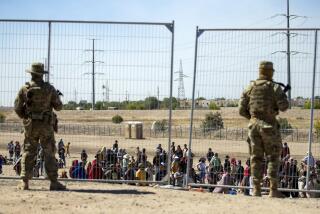OKLAHOMA CITY: AFTER THE BOMB : Republicans Want Slower Track for Anti-Terror Bill : Congress: Dole’s desire for quick vote fades after Senate GOP leaders voice misgivings. Trent Lott warns of giving the FBI too much power.
- Share via
WASHINGTON — Reacting to concerns expressed by both conservatives and civil libertarians, Republican leaders began backing away Tuesday from plans to rush a sweeping new counterterrorism bill through the Senate by next week.
“It’s going to take awhile. We have to make sure we do it right. . . . We have to step back and say: ‘What can we do to give the FBI more authority without trampling on people’s rights,’ ” Senate Majority Leader Bob Dole (R-Kan.) said after a meeting with Republican senators, some of whom voiced misgivings about the bill.
Dole, who only a day earlier had planned to bring the bill to a vote next week, insisted that the bipartisan legislation is still on a fast track. But he also suggested that more time is needed to work with the Clinton Administration on the details of several controversial proposals giving the Federal Bureau of Investigation broader powers than it now has to engage in wiretapping and to monitor paramilitary groups.
Eager to respond to the bomb blast that devastated the federal building in Oklahoma City last week, many lawmakers from both parties said that they still hope the omnibus counterterrorism bill now before the Senate Judiciary Committee can be brought to a floor vote next week.
“There is a lot of support for giving the FBI more authority to infiltrate” anti-government groups, Sen. John B. Breaux (D-La.) said shortly after the Senate unanimously approved a resolution condemning the bombing and urging the swift approval of “legislation to strengthen the authority and resources of all federal agencies involved in combatting such acts of terrorism.”
But several senior Republicans suggested that the Senate should put the bill on hold for a few weeks, take more time to work out its provisions and then incorporate them into the GOP’s version of a new crime bill when it comes to the floor next month.
“The crime bill would be a good place for this legislation,” said Senate Whip Trent Lott (R-Miss.). In the rush to produce a free-standing bill, “we could end up going too far in giving . . . the FBI more power than it should have,” he added.
Republicans denied that their new caution on the counterterrorism bill is a result of pressure by the National Rifle Assn. or right-wing constituencies within their party. But conservative lobbying groups have joined with civil libertarians in voicing concerns about the bill’s wiretapping provisions and the relaxation of current guidelines prohibiting the FBI from investigating paramilitary and other groups unless it has “reasonable” grounds for believing that a crime has or is about to be committed.
Those guidelines were formulated nearly 20 years ago to guard against the abuses that occurred in the late 1960s and early 1970s, when the FBI clandestinely monitored the activities of thousands of Americans, including civil rights groups and anti-Vietnam war protesters, on the vague grounds that they were part of a broad conspiracy to subvert the government.
“We walked that plank in the 1960s,” said Sen. Larry E. Craig (R-Ida.), adding that a number of Republicans had asked Dole not to “rush to judgment” on the legislation that, in its present form, is an amalgam of GOP and Clinton Administration proposals for strengthening the nation’s counterterrorism laws.
Dole said that GOP staff members are working with the White House to fine-tune the proposals and Democrats said that they expect the outlines of a final draft to emerge after a meeting Thursday that Clinton has scheduled with House and Senate congressional leaders from both parties.
In advance of that meeting, however, the bipartisanship with which both sides pledged to move the anti-terrorism bill through Congress in the wake of the Oklahoma City bombing showed more signs of strain as Republicans criticized Clinton’s remarks Monday about right-wing “purveyors of hatred” who dominate the nation’s radio talk shows.
“It’s very important that no one tries to make partisan (gains) out of a national tragedy,” said Sen. Phil Gramm (R-Tex.), a contender for the GOP presidential nomination in 1996. “The President has done an excellent job of bringing Americans together in the aftermath of this tragedy. . . . But last night he came close to engaging (in partisanship).”
“He (Clinton) went over the edge yesterday,” Lott declared. “Turning this tragedy into a political issue . . . is irresponsible.”
At the same time, however, Lott and other Republicans acknowledged that the Oklahoma City bombing is likely to have political repercussions for another partisan debate--this one over gun control.
Times staff writer Janet Hook contributed to this story.
More to Read
Sign up for Essential California
The most important California stories and recommendations in your inbox every morning.
You may occasionally receive promotional content from the Los Angeles Times.










